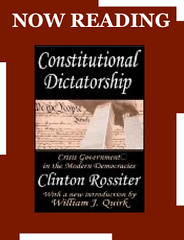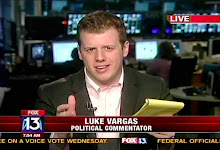At the end of a bright concrete hallway is the darkened floor of the arena. We wait in the shadows under a makeshift television stage, hidden from the view of the crowd. With no warning an announcer's voice fills the room and begins introducing the debate participants. As the last name is read off and Brit Hume pauses for an ad break before the event begins a hand signal is made from halfway across the floor and the race begins. Our footsteps dampened by thick red carpeting, the photographers find the shortest route towards the base of the debate stage. Up the aisles and around the crowd, the looming wall of red, white, and blue seems to lean over us as we draw closer. Arriving there, however, the shiny jewels of the television set and the polished contestants are unimposing, personal, and imperfect.

We're told we have four minutes to take all the photos we can. Some of the photographers kneel down front and center, aiming to catch the head of a mayor or governor at the foot of the towering and colorful facade, while others set up tripods at stage left and catch each man lined up like dominos in matching suits and ties. I realized that every photo I would see in the morning's paper would be taken by someone within feet of me. The guy yelling "dive! dive! dive!" would have his shots in hundreds of papers from the Seattle Times to the Houston Chronicle, and it's likely I would wind up with a photo nearly identical to his. So took a photo of the photographers taking their photos, because I knew that would never be published.
It was oddly silent standing at the base of a television scene. Somehow, in the same room as thousands of students, noisy Ron Paul supporters, and millions of dollars of equipment, cameras, and lights there didn't seem to be any noise; I'm used to more noise coming from ten kids at the back of the high school auditorium. The silence is a blessing because it opens up a window into the movements and noises of the candidates on stage. As the photographers moved around and and angled for their shots I could clearly hear Mitt Romney whisper "time to suck it in, guys," and Duncan Hunter repeatedly saying "we've got a nice crowd here tonight," making the nerdy and obvious comments to himself that nobody responded to.

I lost track of time and didn't hear the press wranglers reminding us how long we had left until it was time to go. We all moved off to stage left and slipped behind the tall black curtain. I couldn't help but peer back behind me and see the stage lights brighten up a notch and the quirky individualism of each candidate turn to the polite and polished faces of the television. The security guard near us around stated firmly that there were to be no photos taken back stage and I faced forward again and marched towards the cement passageway. Cindy McCain leaned on her crutches to my left and gazed back towards the light of the stage.
It took a few minutes for the group of photographers to find its way back to the two hockey training rinks that comprised the spin room and blogger area; without a guide our knack for taking photos served us little in navigating through the intricacies of a place we weren't familiar with. A UNH student with some sort of yarn pullover and tangled hair took the lead and helped us back. He was holding a tiny Nikon Coolpix and was busy looking through his pictures. The guy from the AP looked at me and laughed when he saw the guy was wearing a press pass just like us, but I merely smiled back--though I may have had more equipment than my UNH counterpart, there's a pact between "new media" people that can't be broken--we're still bloggers and student journalists, and five years ago we never would have ended up on the floor of a Fox News Debate.

We pushed through an unmarked door and walked past some students on their way to the weight room before coming upon the converted hockey rinks again. The red carpet of the spin room glistened in the light of the empty television set, and a lonely maintenance worker walked around and made sure everything was working. I broke from the group and followed the plexiglass siding of the rink around the building towards the exit and went outside. To my left was a giant white trailer the size of an 18-wheeler with its supports embedded into the grass outside the arena. The trailer methodically whined as hidden engines supplied power through dozens of thick plastic tubes that snaked back into the building and into the laptops and battery chargers. Some Austrian journalists sat on the railing by the door and had a smoke while reviewing their footage, and I passed by them and up a dark stairway.
Just a little ways up was the main entrance to the arena. I walked through the last of the protesters and sign-holding supporters, all of us clueless as to what was being said inside or whose candidate was really standing out. What had been a noisy and raucous area of competing chants only an hour earlier was peaceful now. At the end of the long fence that had held the crowd back was a simple piece of folded plasterboard stretched out beneath a twisted tree. The two guys watching over it said it was the "Memorial Wall," an imitation of the stone monuments in Washington D.C. of fallen soldiers from decades past. A hundred yards from debating politicians inside an enclosed and vibrant sports hall was a solemn reminder of what should be the most important issue of debate. The first three years of names, about 3,700, were neatly painted on the gray board, with the most recent victims from Iraq printed out on computer paper and waiting to be painted later. One of the men said the woman who did the painting found the task so painful that she had to stop down for a while.

I headed back down the stairs and into the blogger room again, taking a seat in the very back row and spreading my equipment over the table. A number of people at the front of the room typed rapidly, glancing up the television monitors of the debates and summing up video with a few sentences of a blogger's words.
About an hour later I was tapped on the shoulder and told that the spray for the end of the debate was getting ready to leave. I packed up my gear and prepared myself for heading out onto the debate floor and obnoxiously taking a bunch of pictures of candidates I was gradually losing more and more interest in. Not once during my hour of rest in the middle of the debate did the blogger room ever audibly react to anything that was said on the television screens, and I was curious to see what would be spun into interesting news from all of it. The second spray in the arena was longer and less interesting than the first. Students tried to get autographs and pictures themselves, and I ended up trapped next to Brit Hume and Ann Romney on the questioners stage, wondering how long it'd be before I could head back to the spin room.

I had seen a few fashionable twenty-somethings with special VIP passes running past us on the way into the arena after the debate, and sure enough the spin room was packed with smooth talking representatives eager to let everyone know why their candidate really stood out. "Hannity and Colmes" was already live on tv, and Rudy Giuliani smiled under the bright spotlights that filled the room. John McCain entered through the back entrance of the television set and an assistant slipped an earpiece and transmitter onto him before he wandered over to the wing of the stage.

With the cameras rolling and the reporters talking the room started to bustle with activity. I found a step ladder and peered across the floor, locating the most congested areas, assuming there was someone interesting in front of the groups of reporters and cameramen there. Sam Brownback stood underneath an awning with his name on it and took questions from everybody with a pad of paper or a microphone. Each individual had their own reason for being there and a particular question that they wanted to ask, but watching all of it, the questions and answers lacked any coherence.

Some other candidates worked the crowd too, signing autographs and creating semicircles of press in front of them. One girl even managed to get a photograph with Duncan Hunter and said her dad would be so proud to see it. I found the "exciting and unpredictable" spin room to be the epitome of a messed up election process. So much was made of Fred Thompson's decision to skip the debate and his lack of respect for the New Hampshire way of campaigning, but I didn't see anything New Hampshire about manipulative men and women in suits working the television cameras either, and with every candidate going on Hannity and Colmes to explain why they were the clear winner, it seemed just as much an advertisement as Thompson's 30-second spot.

I spent another few minutes taking photos and saying hello to some of the campaign staffers that I knew before heading out to my car. I popped in an old CD instead of listening to talk radio, and drove the two hours back to Boston. It was 3:00 A.M. before I finally went to sleep, but I slept excited to go back to school and my US Government class. Perhaps fifty minutes of Plato, Machiavelli, and history could enlighten me more than ten hours at a debate.
(all photos: © 2007 by Luke N. Vargas. All Rights Reserved.)







No comments:
Post a Comment